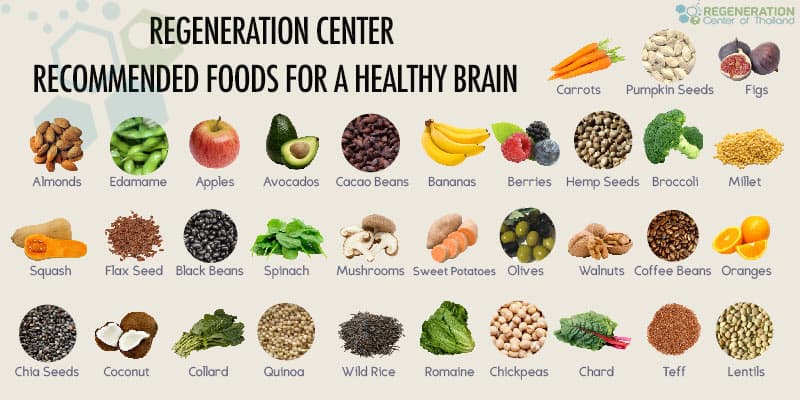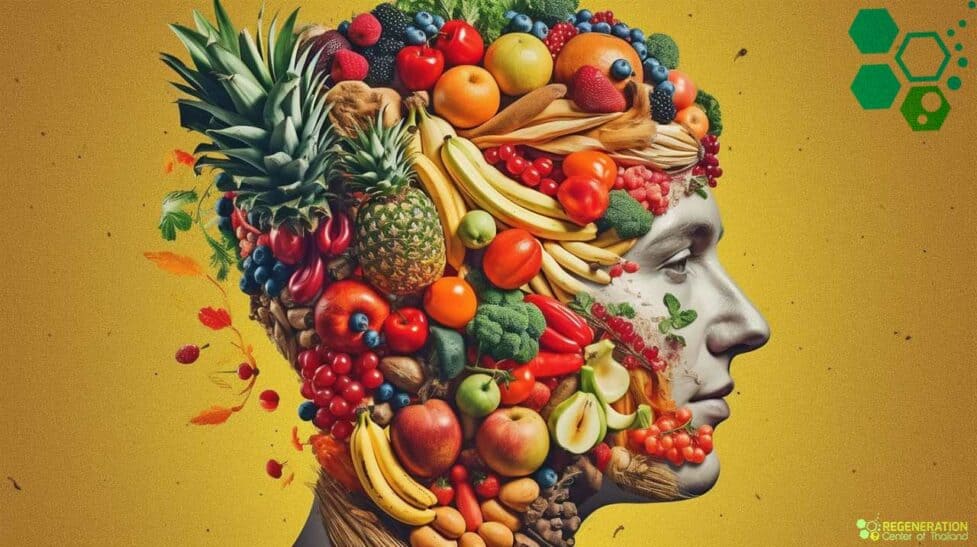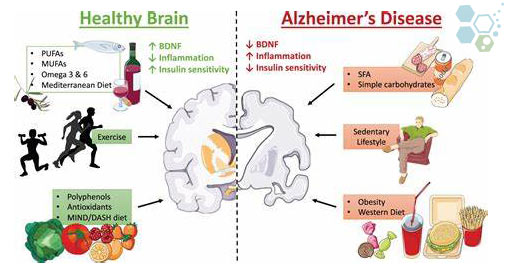Nutrition plays a crucial role in maintaining optimal brain health and cognitive function. The brain requires a constant supply of nutrients to support learning, memory, and decision-making processes. Certain foods benefit brain function, containing omega-3 fatty acids, antioxidants, and B vitamins. Lets explore the best foods for improving brain function and use the following practical tips for incorporating them into your diet [1].
Top 8 Neuro-Friendly Nutrients & Foods for Better Brainpower
- Omega-3 Fatty Acids are essential fats crucial in brain development and function. They have been shown to improve cognitive performance and protect against age-related cognitive decline. Some of the best natural sources of brain nutrients come from of omega-3s include fish such as salmon, mackerel, sardines, flaxseeds, chia seeds, and walnuts.
- Antioxidants and Polyphenols – Antioxidants and polyphenols are compounds in many plant-based foods that help protect the brain from oxidative stress and inflammation. They have been shown to improve cognitive function and reduce the risk of neurodegenerative diseases and neuropathy. Some of the best sources of antioxidants and polyphenols include berries, dark chocolate, green tea, and coffee which are some of the superfoods used to manage inflammation for patients with arthritis.
- B Vitamins play a crucial role in our brain function by helping to produce and regulate neurotransmitters, which are chemicals that allow nerve cells to communicate with each other. Some of the best sources of B vitamins include whole grains, leafy greens, nuts, and seeds which are excellent for patients with nerve injuries.
- Berries are packed with antioxidants and polyphenols that can increase neural cells to improve cognitive function and protect the brain from damage. Some of the best berries for brain health include blueberries, strawberries, raspberries, and blackberries. They can be enjoyed fresh or frozen and added to smoothies, yoghurt bowls, and oatmeal.
- Fatty Fish such as mackerel,salmon and sardines are rich in omega-3 fatty acids which is essential for optimal brain function. These fish also contain high levels of vitamin D, which has been linked to improved cognitive performance. Add fatty fish to your meals at least twice a week to reap the brain-boosting benefits [2].
- Leafy greens such as broccoli, kale and spinach are packed with B vitamins and other nutrients that support brain function, and they also contain powerful antioxidants that can help protect the brain from damage and often part of the kidney diet. Add leafy greens to salads, soups, and stir-fries for a nutritious and delicious boost.
- Seeds and Nuts like pumpkin seeds, almonds, walnuts, and chia seeds are full of vital omega-3 fatty acids, antioxidants, and vitamins. They offer powerful anti-aging properties, make a great snack or can be added to oatmeal, yoghurt, or smoothies for a brain-boosting boost.
- Whole Grains such as quinoa, oats and brown rice are packed with B vitamins and other nutrients that support brain function. They also provide a steady source of energy that can help improve focus and concentration [3]. Try swapping refined grains for whole grains in your meals to boost brainpower and one of the top foods that improve mental health.
How to implementing Brain-Boosting Foods into Your Diet

Planning meals and snacks – Brainfood
One of the best ways to manage senescent cells is by incorporate brain-boosting foods into your diet is to plan your meals and snacks in advance. This can help ensure you have nutritious options and prevent unhealthy fats and food choices. Try meal prepping foods that improve memory and concentration on the weekends or packing healthy snacks to take to work.
Incorporating brain-boosting ingredients into recipes
Another way to incorporate brain-boosting foods into your diet is to use them in recipes. Add berries to smoothies, nuts and seeds to oatmeal, and leafy greens to salads to . You can also use fatty fish in stir-fries or as a topping for salads [4].
Foods that improve mental health- Brain nutrients
Making healthy food choices when eating out. When eating out, it can be challenging to make healthy choices. However, there are still ways to incorporate brain-boosting foods into your meals. Look for dishes that contain leafy greens, fatty fish, or whole grains. You can also ask for substitutions or modifications to make dishes healthier.
Can Low Carb & Ketogenic Diets Boost Brain Health?
A low-carb and ketogenic diet has been shown to have several benefits for brain health. In this diet, the body uses ketones, which are produced when the body breaks down fat, as its primary source of energy instead of glucose.
Here are 6 ways a low-carb and ketogenic diet can boost brain health:
- Improved cognitive function: A ketogenic diet has improved cognitive function, including memory, attention, and mental clarity. This is likely due to the increased production of
 ketones, which can provide the brain with a more stable and efficient energy source.
ketones, which can provide the brain with a more stable and efficient energy source. - Reduced inflammation: Chronic inflammation can damage brain cells and lead to cognitive decline. A low-carb and ketogenic diet has been shown to reduce inflammation in the brain, which can help to protect against cognitive decline.
- Increased production of brain-derived neurotrophic factor (BDNF): BDNF is a protein that promotes the growth and survival of brain cells. A ketogenic diet has been shown to increase the production of BDNF, which can help to protect against cognitive decline, brain fog, boost proliferation of astrocytes and improve brain function.
- Improvement in mitochondrial function: Mitochondria are the powerhouses of all cells in the human body, and they play a crucial role in energy production. A low-carb and ketogenic diet has been shown to improve mitochondrial function and promote angiogenesis,neurogenesis which can help to protect against cognitive decline.
- Improved insulin sensitivity: A low-carb and ketogenic diet can improve insulin sensitivity for diabetics, which can help to protect against cognitive decline. Insulin resistance has been linked to an increased risk of Parkinson’s disease, Alzheimer’s, CFS and other forms of cognitive decline.
- Reduced risk of neurological disorders: A low-carb and ketogenic diet has been clinically shown to help reduce the symptoms of neurological decline for disorders, including ALS, MND, Traumatic brain injuries, brain strokes, MS, Ataxia, Autism, CP and epilepsy.
Overall, a low-carb and ketogenic diet can provide several benefits for brain health, including improved cognitive function, reduced inflammation, increased production of BDNF, enhanced mitochondrial function, improved insulin sensitivity, and reduced risk of neurological disorders [5]. However, The Regeneration Center would like to remind you that consulting with your primary care healthcare professional before starting any new diet is essential, especially if you have a pre-existing medical condition.
Best herbs for brain cell regeneration
Brain-boosting foods in your diet are an excellent way to support optimal brain health and cognitive function. You can improve memory, focus, and decision-making by including fatty fish, leafy greens, berries, nuts, and whole grains. With some planning and creativity, it’s easy to make brain-boosting foods a part of your everyday life.
Published Clinical Citations
[1] ^Gómez-Pinilla F. Brain foods: the effects of nutrients on brain function. Nat Rev Neurosci. 2008 Jul;9(7):568-78. doi: 10.1038/nrn2421. PMID: 18568016; PMCID: PMC2805706.
[2] ^Berding K, Vlckova K, Marx W, Schellekens H, Stanton C, Clarke G, Jacka F, Dinan TG, Cryan JF. Diet and the Microbiota-Gut-Brain Axis: Sowing the Seeds of Good Mental Health. Adv Nutr. 2021 Jul 30;12(4):1239-1285. doi: 10.1093/advances/nmaa181. PMID: 33693453; PMCID: PMC8321864.
[3] ^Krakovski MA, Arora N, Jain S, Glover J, Dombrowski K, Hernandez B, Yadav H, Sarma AK. Diet-microbiome-gut-brain nexus in acute and chronic brain injury. Front Neurosci. 2022 Sep 16;16:1002266. doi: 10.3389/fnins.2022.1002266. PMID: 36188471; PMCID: PMC9523267.
[4] ^Gomez-Pinilla F, Yang X. System biology approach intersecting diet and cell metabolism with pathogenesis of brain disorders. Prog Neurobiol. 2018 Oct;169:76-90. doi: 10.1016/j.pneurobio.2018.07.001. Epub 2018 Jul 27. PMID: 30059718; PMCID: PMC6231047.
[5] ^ Dyńka D, Kowalcze K, Paziewska A. The Role of Ketogenic Diet in the Treatment of Neurological Diseases. Nutrients. 2022 Nov 24;14(23):5003. doi: 10.3390/nu14235003. PMID: 36501033; PMCID: PMC9739023.


 ketones, which can provide the brain with a more stable and efficient energy source.
ketones, which can provide the brain with a more stable and efficient energy source.